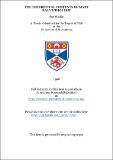Files in this item
The theoretical contexts of Mary Daly's thought
Item metadata
| dc.contributor.advisor | Hampson, Daphne | |
| dc.contributor.author | Waslin, Sue | |
| dc.coverage.spatial | 215 p. | en_US |
| dc.date.accessioned | 2018-06-08T13:35:19Z | |
| dc.date.available | 2018-06-08T13:35:19Z | |
| dc.date.issued | 1998 | |
| dc.identifier.uri | https://hdl.handle.net/10023/13853 | |
| dc.description.abstract | This thesis focuses upon the writings of the contemporary North American feminist theologian Mary Daly. It takes the form of a critical study of Daly's thought in terms of five tributary influences. It represents a contribution to two areas of research: the history of feminist ideas, and the ongoing methodological debate within feminism as to the possible relationship between feminist theory and 'conventional' theory. In chapter one Daly's political thought is introduced through a discussion of the influence of the tradition of radical feminism. The principle aim of this chapter is to clarify, as far as possible, the dual process of influence that exists between her thinking and the work of certain radical feminist theorists. In chapter two the influence of Beauvoirian existentialism upon Daly's thought is examined in the wake of the claim that in drawing from Simone de Beauvoir's feminist existentialist analysis of women's situation, in The Second Sex, Daly assimilates Sartrean existentialist assumptions which are problematic from a feminist perspective. In chapter three turn to address Daly's philosophical- theological debt to Thomas Aquinas and the Thomist tradition. I trace the history of Daly's dealings with Thomism, including her criticism, and briefly evaluate her continued feminist engagement with its ontology. In chapter four Daly's utilisation of Peter L. Berger's sociological theory is explored. I discuss Daly's feminist criticism of Berger's theory of 'worldbuilding' and proceed to evaluate her subsequent attempts to use Berger's work as the starting-point for a new feminist sociology of knowledge. In the fifth and final chapter the abiding influence of Christianity to Daly's 'revolutionary' theological agenda is highlighted and explored with reference to the contemporary division of theological labour between so-called 'reformists' and 'revolutionaries'. The thesis ends with a few concluding remarks about Daly's methodology with regard to 'conventional' theory. | en_US |
| dc.language.iso | en | en_US |
| dc.publisher | University of St Andrews | |
| dc.subject.lcc | BT83.55D2W2 | en |
| dc.subject.lcsh | Feminist theology | en |
| dc.subject.lcsh | Daly, Mary, 1928-2010 | en |
| dc.title | The theoretical contexts of Mary Daly's thought | en_US |
| dc.type | Thesis | en_US |
| dc.contributor.sponsor | British Academy | en_US |
| dc.type.qualificationlevel | Doctoral | en_US |
| dc.type.qualificationname | PhD Doctor of Philosophy | en_US |
| dc.publisher.institution | The University of St Andrews | en_US |
This item appears in the following Collection(s)
Items in the St Andrews Research Repository are protected by copyright, with all rights reserved, unless otherwise indicated.

